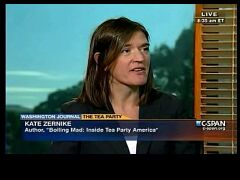Zernike Slams an 'Angry' White, Male, Reactionary Tea Party Movement Mired in the Past
Reporter Kate Zernike, the paper's main reporter on the Tea Party beat, dropped all pretense of fairness in her story for the front of the Sunday Week in Review,"Tea Party Supporters Doing Fine, but Angry Nonetheless."
Sometimes it reads like a parody, with references to Joe McCarthy as a conservative hero. It all starts with that chin-leading headline, rehashing the Times' favorite word to describe the Tea Party movement (hint: it's not the word "fine"). An accompanying photo showed a single "Tea Party activist" at a rally near Albany, N.Y. Where were the others?
Zernike boiled down the results from the paper's recent polling of the Tea Party movement, keeping only what could be spun as racial or extreme views on the part of participants.

Zernike started out mildly, implying puzzlement at why the protesters were out there at all, since they were "wealthier than the general public" and presumably aren't affected by the "government spending and enormous deficits" they are fighting against.
It makes sense that people would take to the streets to protest government spending and enormous deficits during the Great Recession, when they are feeling economic pain most acutely.
But the Tea Party supporters now taking to the streets aren't the ones feeling the pain.
In the results of the latest New York Times/CBS News poll, they are better educated and wealthier than the general public. They are just as likely to be employed, and more likely to describe their economic situation as very or fairly good.
Yet they are disproportionately pessimistic about the economy and the nation. A breathtaking 92 percent said the country is on the wrong track.
What accounts for this gap between how they are faring and how they feel the country is faring? History offers some lessons. The poll reveals a deep conviction among Tea Party supporters that the country is being run by people who do not share their values, for the benefit of people who are not like them. That is a recurring theme of the previous half-century - conservatives in liberal eras declaring the imperative to "Take America Back."
Do only conservatives ever call to "take our country back"? I had no idea that Howard Dean, former chairman of the Democratic National Committee, was a conservative.
Zernike went to Rick Perlstein, a journalist who makes his living as a conservative-basher, for an objective view.
"The story they're telling is that somehow the authentic, real America is being polluted," said Rick Perlstein, the author of books about the Goldwater and Nixon years.
Next Zernike summarized the poll results. When reading them, try and remember if the Times polled anti-war activists on whether or not Bush or Israel was behind the 9-11 attacks. Neither did the Times chide anti-war protesters for marching against something that didn't directly affect them, as Zernike does to the Tea Party movement. Evidently the only possible rational reason for conservatives to march is when their own self-interests are being threatened, never for the good of the country.
And they were almost unanimous in their dislike of President Obama. Overwhelmingly, they said he does not share the values most Americans live by and does not understand the needs and problems of people like them. They are significantly more likely than Republicans or the general public to say that too much attention has been made of the problems facing black people, and that the policies of the Obama administration favor blacks over whites and the poor over the rich or the middle class.
And 3 in 10 do not think he was born in this country.
Zernike strongly hinted that the protesters were almost all white male throwbacks longing for the good old days when there weren't so many minorities running around:
Rick Shenkman, a history professor at George Mason University, said in some respects, he is inclined to take the Tea Party supporters at their word, that they are like the founding fathers in fighting an ideological battle - this one against what they believe is socialism.
But it's not just the Tea Party movement. According to the NYT's poll, most people (52%) believe that Obama is "moving the country more towards socialism."
Zernike continued quoting Shenkman:
"They are concerned that the federal government is too big, and these numbers are incomprehensible in terms of deficits and budgets," he said. "They are so large that nobody can grasp them. It's no wonder that people are baffled by what's going on."
Still, he and others argue that race and age are the biggest factors in shaping the mindset of Tea Party supporters. They tend to be white and male, with a disproportionate number above 45, and above 65. Their memories are of a different time, when the country was less diverse.
Conversations with Tea Party supporters often wind their way into nostalgia. Even those out of work aren't mourning the loss of a job so much as what they see as a loss of an era.
Shouldn't "less diverse" read "less taxed"? Through a hostile liberal frame, Zernike saw citizens calling for a return to an era of a less-onerous federal government as a reactionary wish for a racially homogenous America, though she inconveniently lacked actual quotes from actual Tea Party members that would have boosted her position.
Then again, Zernike is seemingly primed to see racial overtones where none exist, judging by her bizarre hearing of a "Chris Rock voice" from Brookyln-bred young conservative Jason Mattera.
You can follow Times Watch on Twitter.


